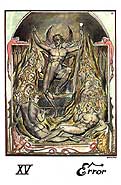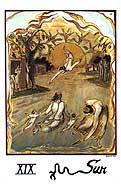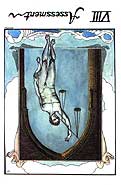| The Two Paths spread provides insight into an important decision ahead of you, the possible outcomes, and the forces that draw you towards each of these outcomes. The William Blake Tarot explores the mystical vision and artistry of the renowned English painter and poet. Through rich interpretations focused on creative undertakings, it has long been the deck of choice for artists, writers, musicians, and thinkers. For more information about this deck, or to buy your own personal copy, go to www.blaketarot.com.
|
 | The top left card represents the first possible outcome. Error: Seeking ego-gratification through manipulation or duplicity. Self-importance. Lacking a sense of humor. Being controlled by your lower nature or personal shadow. Fears engendered by ignorance. Feeling pressured by materialistic, institutional, or corporate agents. Negative obsessions. Blind adulation. Sexual or material bondage. Giving in to temptation, guilt, or panic. |
 | The top right card represents the second possible outcome. Sun: Being illuminated by imagination and inspiration. Liberation from old patterns. Realization of your personal goals. Radiating joy, finding delight in life. A feeling of Returning to the Source. Angels on your shoulders. Things flowing smoothly. Dawning consciousness. Cutting away from the past. Feeling welcomed and at ease. |
 | The middle left card represents the force drawing you towards the first possible outcome. Assessment, when reversed: Inattention to being fair and just. Lack of consideration of commitments, agreements, or negotiations. Refusal to weigh the pros and cons of a situation. Being blind to the needs of self versus others. Inability to transcend a situation or avoid a conflict of interest. |
 | The middle right card represents the force drawing you towards the second possible outcome. Six of Poetry (Cooperation), when reversed: Unwillingness to bring complimentary forces together. Archetypes that should fuel each other remain at odds. Too many cooks spoil the broth. Teamwork gone awry. Trouble dealing with those in high places. Being placed in the middle of two warring parties. In the creative process: This is a time to rely on your intuition to invoke the "eternal attributes" you need to get the job done; cooperate with your visions. |
 | The bottom card represents the critical factor that decides what will come to pass. Two of Poetry (Individuality): "Every Mans Wisdom is peculiar to his own Individuality". Making choices based on personal perception. Evaluating the appearances of things. Exploring alternative ways of looking at a situation. Looking beyond ego-concerns to spiritual ones. Searching for self-knowledge. Deciding between societal and individual points of view. In the creative process: Distinguish between the expression of your Self and the expression of your ego; discover the difference between wise individuality and unwise individualism. |









